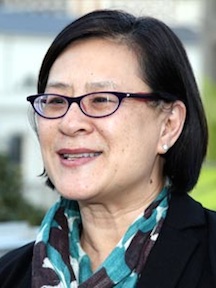Cheyanne Cierpial
Mae Ngai, Lung Family Professor of Asian American Studies and Professor of History at Columbia University, recently traveled to Denison University as part of Phi Beta Kappa’s Visiting Scholar Program. Her lecture, “The United States as a Nation of Immigrants: A Short History of an Idea,” provided an opportunity for students and faculty to think critically about immigration, citizenship, and nationalism. In addition to her lecture, Ngai spent time visiting classes, meeting with students one-on-one, and speaking with a group of Phi Beta Kappa members over lunch.
Madison Kavanaugh, a senior at Denison, explained that visiting scholars “bring new life and knowledge to campus and help refresh dialogue on campus about important issues.” That was the consensus among many students who attended the lecture: visiting scholars expand our insights and perspectives.
“While Denison engages in good dialogue and discussion about academic topics, both inside and outside of the classroom, having visiting scholars exposes us to new information and points of view that can deepen our discussions and widen our knowledge base,” said Ellen Mullan-Jayes, also a senior at the university.
Ngai’s visit drew a diverse group of people from different departments and backgrounds. For some, this was an entirely new subject and method of research.
“As a biology major, I have not had extensive exposure to topics in immigration; however, it is still amazing to have the opportunity to learn about things outside of one’s comfort zone or expertise,” explained Andrew Groff.
For other students, Ngai’s visit and lecture aligned with their academic interests. Meghan Pearce for example, attended the lecture because Ngai’s scholarship touches on aspects of her own research in history and political science.
“I always appreciate an opportunity to listen to an accomplished historian whose work has implications on the way we think about the current state of our world,” Pearce explained. “Additionally, they spend extensive time with us which allows us to better understand the application of conducting research and what inquiry looks like at the highest levels of academic achievement.”
Toni King, professor of Black Studies and Women and Gender Studies, explained that visiting scholars help students connect information and theory to what they are learning both the in classroom and in fieldwork such as off-campus study or internships.
“Visiting scholars help students integrate what they are already learning within and beyond the classroom, and add to the well-rounded educational foundation that makes the liberal arts education distinct,” King said. “Students often get to interact with these scholars during the Q&A, after the event in one-on-one follow ups to the lecture, or during the days of the scholars’ visits. These opportunities are invaluable contributions to students’ intellectual development.”
Linda Krumholz, professor of English and Director of Black Studies at Denison University, described the lecture as a “shortcut to knowledge and inspiration to learn more,” as well as an opportunity for the faculty to expand their knowledge on a topic.
“The wonderful thing about going to a talk like Dr. Ngai’s is how much you can learn in a short period of time. Here is a scholar who has worked for years on immigration history, and in one or two hours she condenses and explains some of her arguments and evidence,” Krumholz observed.
Phi Beta Kappa’s Visiting Scholar Program was founded in 1956 and provides more than 100 colleges and universities the opportunity to exchange ideas with some of America’s most distinguished scholars.
“Having visiting scholars come to campus gives us incredible opportunities to learn about people who have truly embraced the world as a place where life long learning and scholastic exploration know no bound,” Pearce reflected. “Visiting scholars diversify and complicate our understanding about the world, which can spark new questions or expose us to new information or areas of study.”
Cheyanne Cierpial is a senior at Denison University majoring in English Literature and minoring in Psychology. Denison University is home to the Theta of Ohio Chapter of Phi Beta Kappa.




